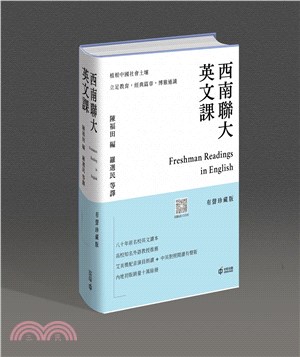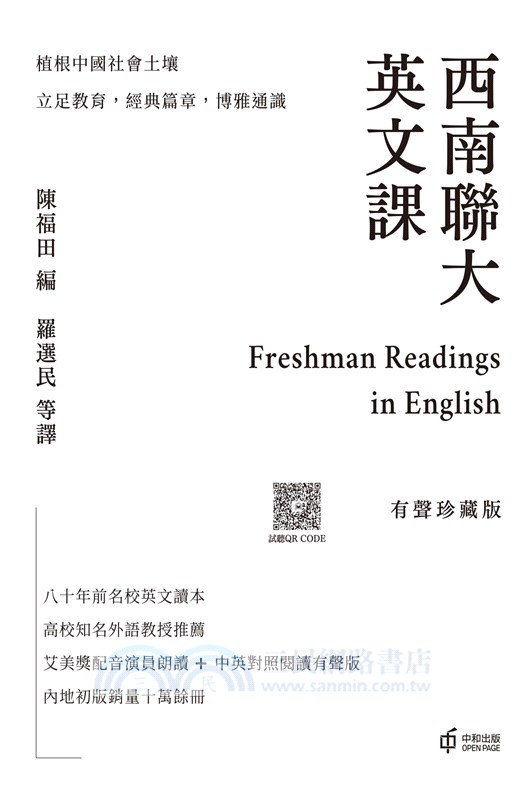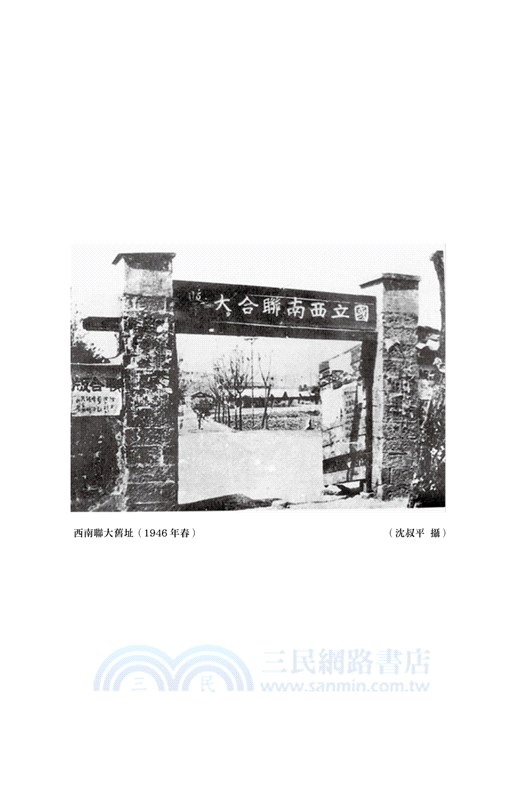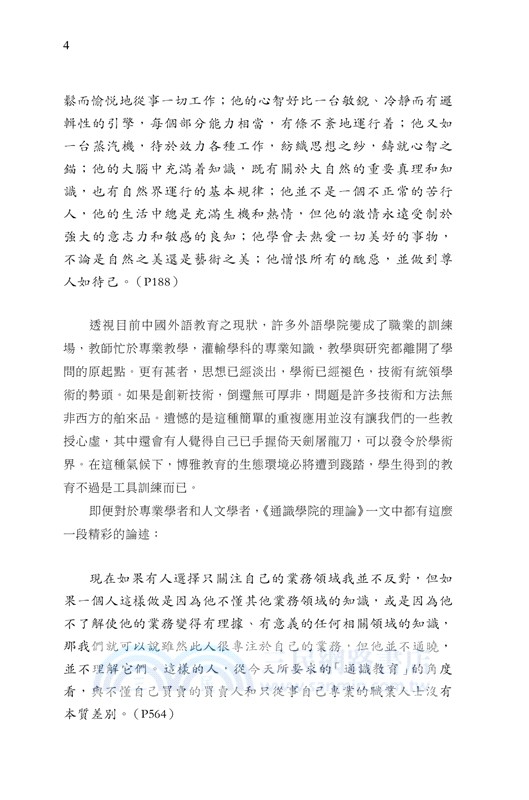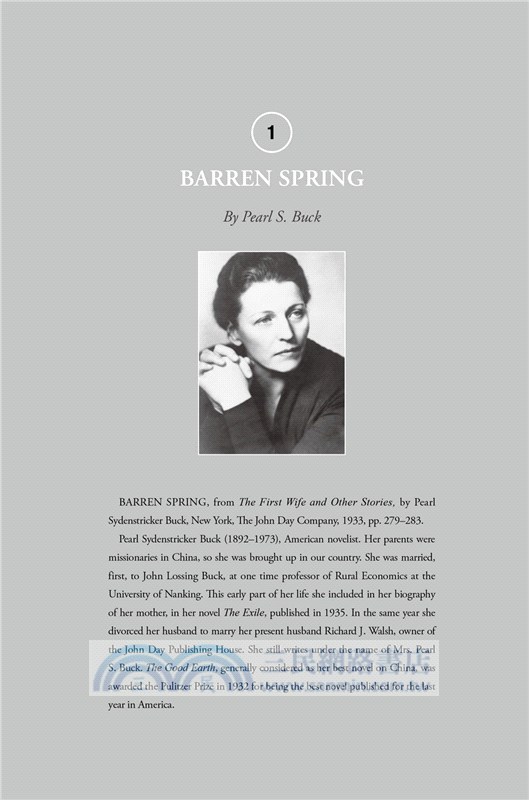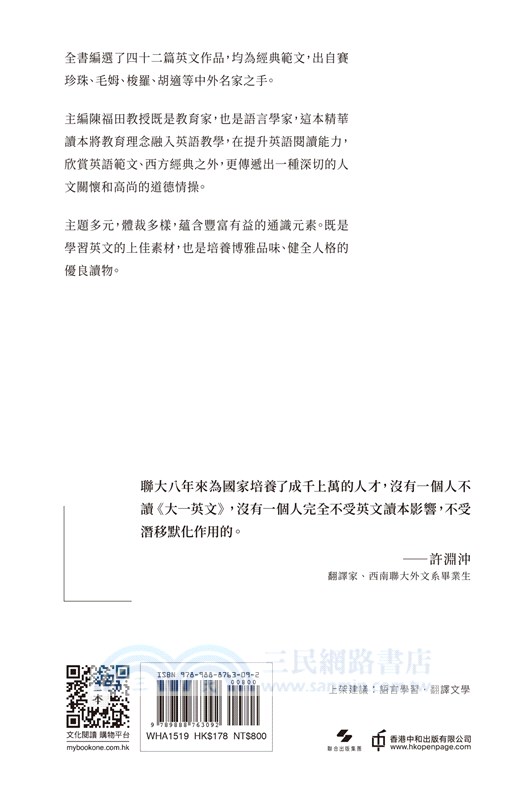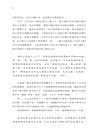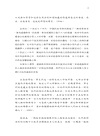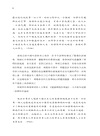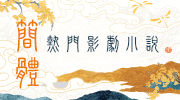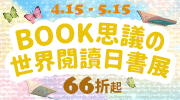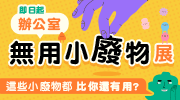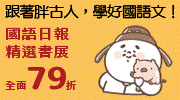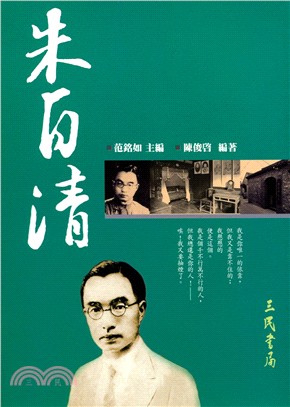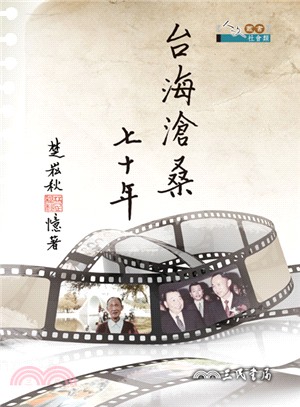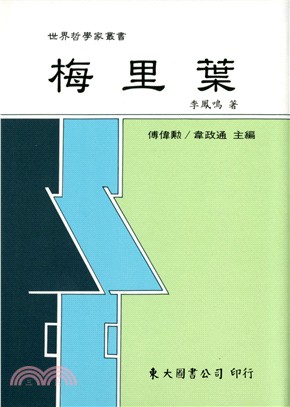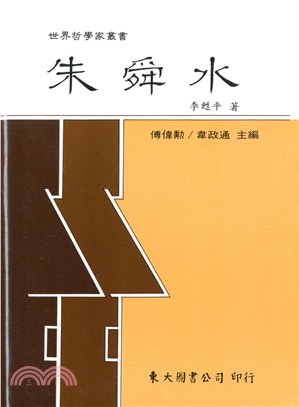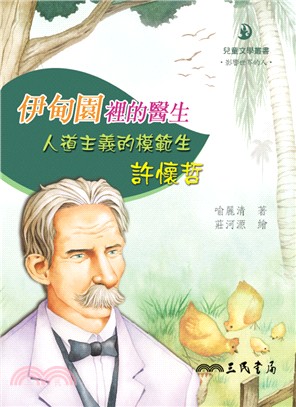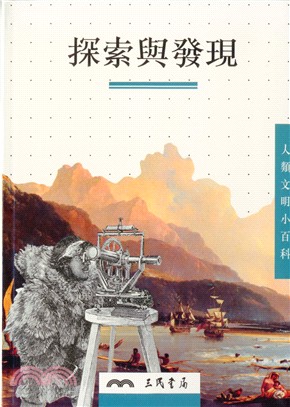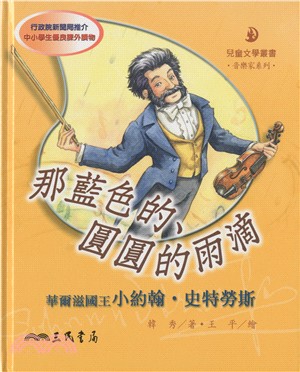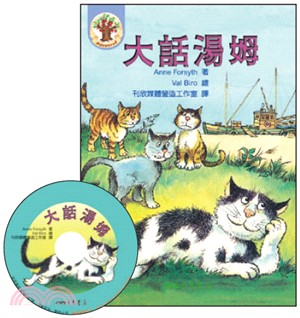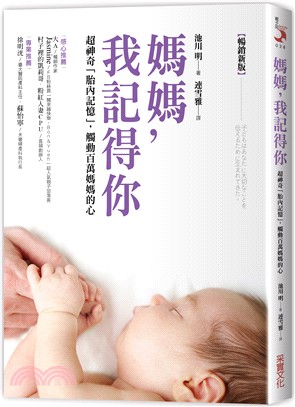商品簡介
中英對照有聲版,艾美獎得主朗讀
大學生英語增值學習必讀本,更能啟發人文關懷和高尚的道德情操;
中英對照每章節配有二維碼音頻,邊聽邊讀雙倍學習成效。
全書編選了四十二篇英文作品,均為經典範文,出自賽珍珠、毛姆、梭羅、胡適等中外名家之手。
主編陳福田教授既是教育家,也是語言學家,這本精華讀本將教育理念融入英語教學,在提升英語閱讀能力,欣賞英語範文、西方經典之外,更傳遞出一種深切的人文關懷和高尚的道德情操。
主題多元,體裁多樣,蘊含豐富有益的通識元素。既是學習英文的上佳素材,也是培養博雅品味、健全人格的優良讀物。
作者簡介
編者簡介
陳福田(Ching Fook-tan)
著名的外國語言文學專家、西洋小說史專家。1897年出生於夏威夷,哈佛大學教育學碩士。曾任美國檀香山明倫學校教師,美國波士頓中華青年會幹事。1923起執教於清華大學。曾任清華大學外國語言文學系主任、西南聯合大學外文系主任。1948年離開中國移居夏威夷,1956年逝世。
主譯簡介
羅選民
廣西大學君武學者,外國語學院院長,博士生導師;清華大學翻譯與跨學科研究中心主任;墨爾本大學亞洲學者講座教授。主要研究方向:翻譯與跨文化研究,英漢語比較研究,比較文學。
名人/編輯推薦
「聯大八年來為國家培養了成千上萬的人才,沒有一個人不讀《大一英文》,沒有一個人完全不受英文讀本影響,不受潛移默化作用的。」
——許淵沖 翻譯家、西南聯大外文系畢業生
目次
貧瘠的春天 賽珍珠 001
2 The Beast of Burden By W. Somerset Maugham
負重的牲口 威廉.薩默塞特.毛姆 011
3 The Song of the River By W. Somerset Maugham
河之歌 威廉.薩默塞特.毛姆 020
4 Birth of a Sister By Tan Shih-hua
妹妹的出生 鄧惜華 025
5 A Dissertation upon Roast Pig By Charles Lamb
論烤豬 查爾斯.蘭姆 034
6 An Optimist Looks at China By Hu Shih
樂觀看中國 胡適 048
7 A Sacred Mountain By G. Lowes Dickinson
聖山 高兹沃斯.洛斯.迪金森 054
8 Fragments from a Flower Diary By Nora Waln
花事記憶 諾拉.沃恩 068
9 A Word to Youth By Andre Maurois
致青年 安德烈.莫洛亞 086
10 A Pair of Woodpeckers
一對啄木鳥 佚名 096
11 The Battle of the Red and the Black Ants By Henry David Thoreau
紅螞蟻大戰黑螞蟻 亨利.戴維.梭羅 105
12 Liberty By Woodrow Wilson
論自由 伍德羅.威爾遜 112
13 What Is Science? By Ira Remsen
何為科學? 里拉.雷姆森 117
14 The Durable Satisfactions of Life By Charles W. Eliot
對生活的持久滿足 查爾斯.W. 艾略特 126
15 The Imaginary Invalid By Jerome K. Jerome
妄想的病人 哲羅姆.K. 哲羅姆 136
16 The Tell-Tale Heart By Edgar Allan Poe
泄密的心 埃德加.愛倫.坡 145
17 The Widow and Her Son By Washington Irving
孤兒寡母 華盛頓.歐文 158
18 The Champion Snorer From the “Burlington Hawkeye”
呼嚕王 佚名 170
19 A Liberal Education By Thomas Henry Huxley
通識教育 托馬斯.亨利.赫胥黎 177
20 The Function of Education in Democratic Society By Charles W. Eliot
民主社會中教育之功用 查爾斯.W. 艾略特 189
21 What Shall We Educate for? By Bertrand Russell
教育的目的 伯特蘭.羅素 201
22 The Strength of Democracy By Walter Lippmann
民主的力量 沃爾特.李普曼 215
23 Technological Civilization By Charles A. Beard
技術文明 查爾斯.奧斯丁.比爾德 223
24 The Social Value of the College-Bred By William James
大學生的社會價值 威廉.詹姆斯 230
25 Liberty and Discipline By Abbott Lawrence Lowell
自由與約束 阿伯特.勞倫斯.洛維爾 253
26 The Liberation of a People’s Vital Energies By Woodrow Wilson
民族生命力的解放 伍德羅.威爾遜 283
27 Habit By William James
習慣 威廉.詹姆斯 304
28 Why a Classic Is a Classic By Arnold Bennett
經典之所以為經典 阿諾德.本涅特 324
29 Evolution By John Galsworthy
時代變遷 約翰.高爾斯華綏 335
30 Fighting in Gallipoli By John Masefield
加利波利戰役 約翰.梅斯菲爾德 346
31 The Half Mile By T. O. Beachcroft
半英里 T. O. 比奇克羅夫特 361
32 The Long Shadow By John Hampson
長長的陰影 約翰.漢普森 391
33 The Field Where the Satyrs Danced By Lord Dunsany
薩梯跳舞的田野 鄧薩尼勳爵 399
34 Every Man’s Natural Desire to Be Somebody Else By Samuel McChord Crothers
人人想當別人 塞繆爾.麥考德.克羅瑟斯 408
35 The Philosopher By W. Somerset Maugham
哲學家 威廉.薩默塞特.毛姆 436
36 Bismarck By Emil Ludwig
俾斯麥 埃米爾.路德維希 456
37 The Riddle of Hitler By Stephen H. Roberts
希特拉之謎 斯蒂芬.H. 羅伯茨 480
38 British Foreign Policy By John Gunther
英國外交政策 約翰.根室 488
39 The American Love of Freedom By Edmund Burke
美國人對自由之熱愛 埃德蒙.伯克 494
40 What Is a University? By John Henry Newman
甚麼是大學? 約翰.亨利.紐曼 510
41 The Theory of the Liberal College By Alexander Meiklejohn
通識學院的理論 亞歷山大.米克爾約翰 530
42 Self-Cultivation in English By George Herbert Palmer
英語學習的自我培養 喬治.赫伯特.帕默 568
書摘/試閱
BARREN SPRING By Pearl S. Buck
BARREN SPRING, from The First Wife and Other Stories, by Pearl Sydenstricker Buck, New York, The John Day Company, 1933, pp. 279–283. Pearl Sydenstricker Buck (1892–1973), American novelist. Her parents were missionaries in China, so she was brought up in our country. She was married, first, to John Lossing Buck, at one time professor of Rural Economics at the University of Nanking. This early part of her life she included in her biography of her mother, in her novel The Exile, published in 1935. In the same year she divorced her husband to marry her present husband Richard J. Walsh, owner of the John Day Publishing House. She still writes under the name of Mrs. Pearl S. Buck. The Good Earth, generally considered as her best novel on China, was awarded the Pulitzer Prize in 1932 for being the best novel published for the last year in America.
Liu, the farmer, sat at the door of his one-room house. It was a warm evening in late February, and in his thin body he felt the coming of spring. How he knew that the time had now come when sap should stir in trees and life begin to move in the soil he could not have told himself. In other years it would have been easy enough. He could have pointed to the willow trees about the house, and shown the swelling buds. But there were no more trees now. He had cut them off during the bitter winter when they were starving for food and he had sold them one by one. Or he might have pointed to the pinktipped buds of his three peach trees and his six apricot trees that his father had planted in his day so that now, being at the height of their time, they bore a load of fruit every year. But these trees were also gone. Most of all, in any other year than this he might have pointed to his wheat fields, where he planted wheat in the winter when the land was not needed for rice, and where, when spring was moving into summer, he planted the good rice, for rice was his chief crop. But the land told nothing, this year. There was no wheat on it, for the flood had covered it long after wheat should have been planted, and it lay there cracked and like clay but newly dried. Well, on such a day as this, if he had his buffalo and his plow as he had always had in other years, he would have gone out and plowed up that cracked soil. He ached to plow it up and make it look like a field again, yes, even though he had not so much as one seed to put in it. But he had no buffalo. If anyone had told him that he would eat his own water buffalo that plowed the good land for him, and year after year pulled the stone roller over the grain and threshed it at harvest, he would have called that man idiot. Yet it was what he had done. He had eaten his own water buffalo, he and his wife and his parents and his four children, they had all eaten the buffalo together. But what else could they do on that dark winter’s day when the last of their store of grain was gone, when the trees were cut and sold, when he had sold everything, even the little they had saved from the flood, and there was nothing left except the rafters of the house they had and the garments they wore? Was there sense in stripping the coat off one’s back to feed one’s belly? Besides, the beast was starving also, since the water had covered even the grass lands, and they had had to go far afield to gather even enough to cook its bones and flesh. On that day when he had seen the faces of his old parents set as though dead, on that day when he had heard the crying of his children and seen his little daughter dying, such a despair had seized him as made him like a man without his reason, so that he had gathered together his feeble strength and he had done what he said he never would; he had taken the kitchen knife and gone out and killed his own beast. When he did it, even in his despair, he groaned, for it was as though he killed his own brother. To him it was the last sacrifice. Yet it was not enough. No, they grew hungry again and there was nothing left to kill. Many of the villagers went south to other places, or they went down the river to beg in the great cities. But he, Liu the farmer, had never begged. Moreover, it seemed to him then that they must all die and the only comfort left was to die on their own land. His neighbor had come and begged him to set forth with them; yes, he had even said he would carry one of the old parents on his back so that Liu might carry the other, seeing that his own old father was already dead. But Liu had refused, and it was well, for in the next two days the old mother was dead, and if she had died on the way he could only have cast her by the roadside lest the others be delayed and more of them die. As it was he could put her safely into their own ground, although he had been so weak that it had taken him three days to dig a hole deep enough for her little old withered body. And then before he could get her buried he and his wife had quarreled over the poor few clothes on the old body. His wife was a hard woman and she would have buried the old mother naked, if he had let her, so as to have the clothes for the children. But he made her leave on the inner coat and trousers; although they were only rags after all, and when he saw the cold earth against his old mother’s flesh—well, that was sorrow for a man, but it could not be helped. Three more he had buried somehow, his old father and his baby daughter and the little boy who had never been strong. That was what the winter’s famine had taken from them. It would have taken them all except that in the great pools lying everywhere, which were left from the flood, there were shrimps, and these they had eaten raw and were still eating, although they were all sick with a dysentery that would not get well. In the last day or so his wife had crawled out and dug a few sprouting dandelions. But there was no fuel and so they also were eaten raw. But the bitterness was good after the tasteless flesh of the raw shrimps. Yes, spring was coming. He sat on heavily, looking out over his land. If he had his buffalo back, if he had his plow that they had burned for fuel, he could plow the land. But when he thought of this as he did many times every day, he felt helpless as a leaf tossed upon the flood. The buffalo was gone; gone also his plow and every implement of wood and bamboo, and what other had he? Sometimes in the winter he had felt grateful that at least the flood had not taken all the house as it had so many other houses. But now suddenly it came to him that he could be grateful for nothing, no, not even that he had his life left him and the life of his wife and the two older children. He felt tears come into his eyes slowly as they had not even come when he buried his old mother and saw the earth fall against her flesh, bared by the rags which had comforted him that day. But now he was comforted by nothing. He muttered to himself.
參考譯文
作品簡介
《貧瘠的春天》一文選自賽珍珠所著《原配夫人和其他故事》,紐約的約翰.戴 出版公司 1933 年出版, 279—283 頁。
作者簡介
賽珍珠(1892—1973),美國小說家,因其父母在中國傳教而在中國長大。 她的首任丈夫卜凱曾任金陵大學(現南京大學前身)農業經濟學教授。賽珍珠在其 1935 年出版的為母親所寫的傳記《流亡者》中提及了自己的這段早年經歷。是年, 她與卜凱離婚,並嫁給約翰.戴出版公司的所有人理查德.沃爾什。她以賽珍珠 的筆名創作的小說《大地》1932 年獲普利策獎,被評為當年在美國出版的最佳小 說,也被認為是賽珍珠關於中國的小說中最出色的一部。
貧瘠的春天
農民老劉坐在自己僅有的一間房門口。那是二月末一個溫煦的黃 昏,他瘦削的身體已經感知到春天的來臨。他怎會知道正是這時候樹木 的汁液開始顫動,泥土中的生命開始蘇醒呢?他無法給自己一個答案。 可是在往年,這本是一件極容易的事情。他本可以指着屋子四周的柳 樹,給大家看就要抽條的嫩芽。但是現在樹已經沒有了,嚴冬饑荒時被 他全砍了,一棵一棵地賣了。或者他本來還可以指着父親年輕時親手栽 種的三株桃樹和六棵杏樹,給大家看那粉嫩的花苞。這些果樹正值壯 年,每年都會結下纍纍的果實。但是這些樹也沒有了。最重要的是,往 年他還會指着麥地給大家看。在這塊地上,他冬天種麥子,因為那個時令沒法種水稻;快入夏時,他就會插秧種稻子,而且收成很好。水稻是 他田裡的主要農作物。但是今年地裡啥也沒有。沒有離離的麥子,因為 該種麥子的時候,田地被洪水淹沒了,現在地都開裂了,像剛乾不久的 黏土一樣。
好吧,在這樣一個日子裡,要是還和往年一樣,他的水牛還在,耕 犁還在,他應該早已經出門去耕種那片已經開裂的土地了。他很想念犁 地,想念平整耕田的樣子,是的,就算他連一顆可以播撒的種子也沒有。 但如今他沒有水牛了。要是先前有人勸他把他的水牛宰了吃,他一定會 痛罵那個人是個王八犢子。他的水牛可是耕地能手,豐收時還可以幫着 拉石磨碾穀子。但這都是過去時了。他已經吃掉了自己的水牛。他和他 的妻子、父母還有四個孩子一起把水牛給吃了。
但是,在那個昏暗的冬日裡,他們吃完了儲藏的最後一點糧食,樹 也砍光賣了錢,能賣的都賣了,連從洪水中救出的那一點點東西也都賣 了,除了房樑和身上的衣服,甚麼都沒有剩下,他們還能怎麼辦?剝掉 衣服來填肚子有意義嗎?而且當時牲口也已快餓死了,因為洪水已淹沒 草地,連煮牲口的骨和肉所需的柴草也得走很遠才能撿夠。那一天,他 看到自己年邁的父母面如死灰,聽到孩子們哭泣不停,眼見小女兒奄奄 一息,他被一陣慘痛的絕望鉗住,變得失去了理智,然後鼓起虛弱的氣 力,做了他說過永遠不會做的事情。他到廚房拿起刀,走出去,把自己 的牲口給宰了。那一刻他絕望地呻吟着,好像親手殺了自己的兄弟。對 他而言,這是最後的犧牲。
但這還不夠。是的,他們又開始遭受飢餓的折磨,但已經沒有甚麼 可殺的了。村子裡很多人南下投奔別的地方,或者到河流下游的大城市 去乞討。但農民老劉絕不乞討。而且他覺得反正大家遲早都要死,死在 自己的土地上是剩下的唯一的安慰。鄰居來求他,讓他跟他們一起動 身;是的,他的鄰居看到自己的老父親已命歸黃泉時,甚至提出願意跟 老劉一道背他的父母趕路。但老劉拒絕了。這樣也不錯,因為兩天以後 他的老母親就死了。要是死在半路上,他只能把屍體扔在路邊,否則還得耽誤其他人的時間,讓更多人因此死去。現在呢,雖說他身體已經十 分虛弱,花了整整三天才挖出一個夠深的土穴來掩埋母親乾癟的身軀, 但畢竟他可以把她安好地埋葬在自己的土地上。就在母親下葬之前,他 和老婆吵了一架,就為老人屍體上那點可憐的衣服。他老婆是個硬心腸 的女人,假如老劉同意的話,她就要讓婆婆光着身子下葬,這樣一來扒 下來的衣服就可以給孩子們穿。但是老劉還是給母親穿了內衣和褲子離 開,儘管那都已經是破布了。當他看到冰冷的泥土蓋在老母親的皮肉上 時─喔,這對一個男人來說是一種悲哀,但是又有甚麼辦法呢?然後 他又親手將他的老父親、幼小的女兒和一個從未長結實的小兒子一個個 埋入泥土。
主題書展
更多主題書展
更多書展本週66折
您曾經瀏覽過的商品
購物須知
為了保護您的權益,「三民網路書店」提供會員七日商品鑑賞期(收到商品為起始日)。
若要辦理退貨,請在商品鑑賞期內寄回,且商品必須是全新狀態與完整包裝(商品、附件、發票、隨貨贈品等)否則恕不接受退貨。




